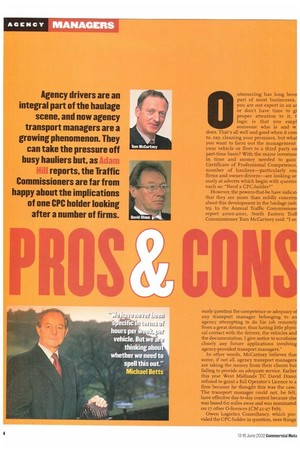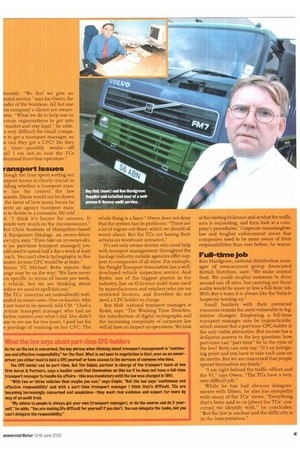Agency drivers are an integral part of the haulage scene,
Page 44

Page 45

If you've noticed an error in this article please click here to report it so we can fix it.
and now agency transport managers are a growing phenomenon. They can take the pressure off busy hauliers but, as 4dam Hill reports, the Traffic Commissioners are far from happy about the implications of one CPC holder looking after a number of firms. utsourcing has long been part of most businesses. you are not expert in an at or don't have time to gi proper attention to it, t logic is that you empl someone who is and w does. That's all well and good when it corn to, say, cleaning your premises, but what you want to farm out the management your vehicle or fleet to a third party on part-time basis? With the major investme in time and money needed to gain Certificate of Professional Competence, number of hauliers—particularly sm, firms and owner-drivers—are looking se ously at adverts which begin with questio: such as: "Need a CPC-holder?"
However, the powers-that-be have indicat that they are more than mildly concern+ about this development in the haulage inch: try. In the Annual Traffic Commissione report 2000-2001, North Eastern Trafl Commissioner Tom McCartney said: "I se ously question the competence or adequacy of any transport manager belonging to an agency attempting to do his job remotely from a great distance, thus having little physical contact with the drivers, the vehicles and the documentation. I give notice to scrutinise closely any future applications involving agency-provided transport managers."
In other words, McCartney believes that some, if not all, agency transport managers are taking the money from their clients but failing to provide an adequate service. Earlier this year West Midlands TC David Dixon refused to grant a full Operator's Licence to a firm because he thought this was the case. The transport manager could not, he felt, have effective day-to-day control because she was based 6o miles away and was nominated on 17 other 0-licences (CM 21-27 Feb).
Owen Logistics Consultancy, which provided the CPC-holder in question, sees things ferently. "We feel we give an ential service," says Joe Owen, the alder of the business. All but one 'us company's clients are ownervers. "What we do is help one or )-man organisations to get into market and stay legal," he adds. 's very difficult for small compa's to get a transport manager, so w can they get a CPC? Do they .e time—possibly weeks—off rk? I am not so sure the TCs derstand front-line operators,"
ransport issues
:hough the time spent sorting out nsport issues is clearly crucial in riding whether a transport maner has the control the law mands, Dixon would not be drawn the issue of how many hours he ?ects an agency transport maner to devote to a customer. He told vI: "I think it's horses for courses. It pends very much on the circumstances." But Chris Sessions of Hampshire-based 'Ej Equipment Haulage, an owner-driver ice 1973, says: "If you take on Ica owner-drirs [as part-time transport manager] you iuld need to spend half a day a week at least each. You can't check tachographs in five mutes, so your CPC would be at stake." Senior TC Michael Betts reports that ange may be on the way: "We have never en specific in terms of hours per week, r vehicle, but we are thinking about iether we need to spell this out."
The TCs' concerns are undoubtedly wellunded in some cases. One ex-haulier, who I not want to be named, told CM: "I had a it-time transport manager who had no fective control over what I did. She didn't me to see me for two years. I paid her for e privilege of running on her CPC. The whole thing is a farce." Owen does not deny that the system has its problems: "There are a lot of rogues out there, which we should all worry about. But the TCs are basing their actions on worst-case scenarios."
It's not only owner-drivers who need help with transport management: throughout the haulage industry outside agencies offer support to companies of all sizes. For example, the Freight Transport Association has a welldeveloped vehicle inspection service. And Ryder, one of the biggest players in the industry, has an 0-licence audit team used by manufacturers and retailers who are on restricted licences, and therefore do not need a CPC-holder in charge.
Roy Holt, national transport manager at Ryder, says: "The Working Time Directive, the introduction of digital tachographs and the increasing complexity of corporate law will all have an impact on operations. We look
at the existing 0-licence and at what the traffic area is requesting, and then look at a company's procedures." Corporate manslaughter law and tougher enforcement mean that companies need to be more aware of their responsibilities than ever before, he warns.
Full-time job
Ken Hardgrave, national distribution manager of own-account group Associated British Nutrition, says: "We make animal feed. We could employ someone to drive around our 18 sites, but carrying out those audits would be more or less a full-time job. With Roy's team it is always like the Vehicle Inspector turning up."
Small hauliers with their restricted resources remain the most vulnerable to legislative changes. Employing a full-time transport manager may be impracticable, which means that a part-time CPC-holder is the only viable alternative. But no-one has a definitive answer to the key question: how part-time can "part-time" be in the eyes of the law? Betts can only say: "It's an intriguing point and you have to take each case on its merits. But we are concerned that people spread themselves too thinly."
"I am right behind the traffic offices and the VI," says Owen. "The TCs have a very, very difficult job."
While he has had obvious disagreements with Dixon, he also has sympathy with many of the TCs' views. "Everything that's been said to us [about the TCs' concerns] we identify with," he concludes. "But the law is unclear and the difficulty is in the interpretation."




















































































































































